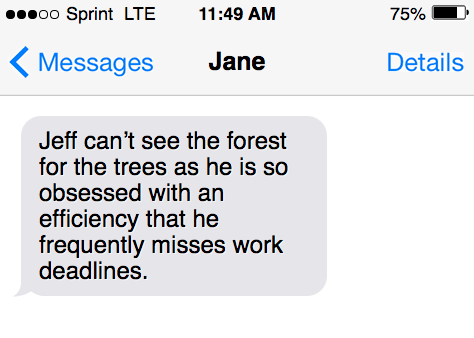What does “can’t see the forest for the trees” mean? What’s the origin of the idiom? You may have heard someone say “they can’t see the forest for the trees” and wondered about its exact meaning.
Learn more about the idiom in this short guide…
What does “Can’t See the Forest for the Trees” mean?
The idiom “can’t see the forest for the trees” means that the parts are distracting you from comprehending the whole. You can’t see the entirety as you are preoccupied with the details and overlook the bigger picture or the end goal.
In this context, it signifies the trees are obscuring the fact that they collectively form a forest.
Figuratively it means you are lost in the maze of details and cannot discern that there is something larger behind what’s apparent.

The phrase also indicates a faulty approach to problem-solving or poor decision-making. You could get too involved in any situation or catch up in the moment and overlook the more significant issue.
You may not realize the implications of any action you undertake to resolve an issue. It could turn out to be counterproductive and further worsen the problem in the long run.
The idiom signifies that any potential solution needs to go beyond the obvious details. A good resolution has to address any situation holistically as the sum of different interconnected aspects.
So you may need to take a step back to get a better understanding of the different principles at work. You could have to detach yourself from the proceedings to get a clearer perspective of your current trajectory in relation to your overall plans.
Origin of the idiom “Can’t See the Forest for the Trees”
The idiom “can’t see the forest for the trees” has a long history dating back to pre-Renaissance times. The first documented use of the expression is in a collection of proverbs by the English playwright John Heywood in 1546.
The original proverb in Old English used the word “wood” instead of “forest.”
The proverb was used as a criticism of the Pope during the reign of King Charles II of England when pecuniary matters took precedence over religious affairs.
The word “forest” replaced “wood” in later references though both terms are often used interchangeably since the 1800s.
Synonyms for “Can’t See the Forest for the Trees”
An alternative form of the idiom is the British variant, “can’t see the wood for the trees.”
Some variations of the idiom “can’t see the wood for the trees” are,
- You can’t see the forest through the trees
- The proverbial tree falling in the forest
- Miss the forest for the trees
- Miss the wood for the trees
- Miss the woods for the trees
The idiom is commonly used in other languages. For example, in French, “c’est l’arbre qui cache le forêt” means “it’s the tree that hides the forest.”
Some related expressions and words include:
- Can’t think straight
- Get the wrong end of the stick
- Get your wires crossed
- Deluded
- Confused
- Bewildered
- Perplexed
Examples of “Can’t See the Forest for the Trees” in a sentence
The idiom has a negative connotation and is often used to express subtle disapproval of someone’s ideas.
It’s frequently employed while making a comment or airing an opinion about an individual, group, or organization’s mental acumen.
- Jeff can’t see the forest for the trees as he is so obsessed with an efficiency that he frequently misses work deadlines.
- The CEO is facing accusations that he can’t see the forest for the trees after outsourcing the company’s operations to a country rife with political instability.
- Mary’s coach told her that she can’t see the forest for the trees after Mary overexerted herself during the pre-season training and had to withdraw from the Olympics due to injury.
- The NGO said that the police department can’t see the forest for the trees after cracking down on drug addiction without addressing the bigger problem of drug trafficking.
- A summary should have just enough information to let you understand the gist of any story, but it shouldn’t include too many details that you can’t see the forest for the trees.
Differences between “can’t see the forest for the trees” and “can’t see the forest through the trees”
The idiom “can’t see the forest for the trees” is more commonly used than “can’t see the forest through the trees.” Both idioms have essentially the same meaning.
However, the phrase “can’t see the forest through the trees” is used more in contexts where you perform some action. The expression “can’t see the forest for the trees” is often used when making decisions or strategizing.
For example, you can’t see the forest through the trees when you are so engrossed in doing something that you forget why you were doing it in the first place. The idiom is used to indicate inexperience and naïve or impressionable nature.
Who said you “can’t see the forest through the trees?”
The first recorded phrase use in American English is by writer John Heywood’s proverbs collection in 1546. Since then, the phrase has been used in literature, media, and entertainment several times.
Demi Lovato used the idiom in the lyrics of her song Nightingale, part of her album Demi, which was released in 2014.
C.S. Lewis used a novel version of the phrase while reviewing William Golding’s novel “The Inheritors” when he said, “you couldn’t see the wood for the leaves.”
Common questions
Questions about the idiom.
How is the idiom used today?
For example, if someone is obsessing over light fixtures but not seeing the entire house during construction. They are “not seeing the forest for the trees.” Small details, while important, shouldn’t distract from “the entire forest.”
Is the idiom a bad thing?
It can be a negative term. Used to say that “minor details” are distracting someone from the big picture. In the home example, focusing on “one doorknob” rather than the home. Someone could say, “Focusing on these things rather than the entire house makes me think he can’t see the forest from the trees.”
If a person spends half the day on a minor detail, they will slow down the progress of the entire project. Think “big picture” vs. “small picture.” Or “larger plans” and “smaller plans.”
Sources
- Can’t see the forest for the trees – Idioms by The Free Dictionary
- How to Use Cannot See the Forest for the Trees Correctly
- can’t see the forest for the trees | Vocabulary – EnglishClub
- You Can’t See the Forest for the Trees!
- What’s the meaning of “Can’t See the Forest Through the…
- What do People Mean When They Say Someone can’t See
- What Does “Can’t See The Forest For The Trees” Mean?
Inside this article
Fact checked:
Content is rigorously reviewed by a team of qualified and experienced fact checkers. Fact checkers review articles for factual accuracy, relevance, and timeliness. Learn more.
Core lessons
Glossary
- Abstract Noun
- Accusative Case
- Anecdote
- Antonym
- Active Sentence
- Adverb
- Adjective
- Allegory
- Alliteration
- Adjective Clause
- Adjective Phrase
- Ampersand
- Anastrophe
- Adverbial Clause
- Appositive Phrase
- Clause
- Compound Adjective
- Complex Sentence
- Compound Words
- Compound Predicate
- Common Noun
- Comparative Adjective
- Comparative and Superlative
- Compound Noun
- Compound Subject
- Compound Sentence
- Copular Verb
- Collective Noun
- Colloquialism
- Conciseness
- Consonance
- Conditional
- Concrete Noun
- Conjunction
- Conjugation
- Conditional Sentence
- Comma Splice
- Correlative Conjunction
- Coordinating Conjunction
- Coordinate Adjective
- Cumulative Adjective
- Dative Case
- Determiner
- Declarative Sentence
- Declarative Statement
- Direct Object Pronoun
- Direct Object
- Diction
- Diphthong
- Dangling Modifier
- Demonstrative Pronoun
- Demonstrative Adjective
- Direct Characterization
- Definite Article
- Doublespeak
- False Dilemma Fallacy
- Future Perfect Progressive
- Future Simple
- Future Perfect Continuous
- Future Perfect
- First Conditional
- Irregular Adjective
- Irregular Verb
- Imperative Sentence
- Indefinite Article
- Intransitive Verb
- Introductory Phrase
- Indefinite Pronoun
- Indirect Characterization
- Interrogative Sentence
- Intensive Pronoun
- Inanimate Object
- Indefinite Tense
- Infinitive Phrase
- Interjection
- Intensifier
- Infinitive
- Indicative Mood
- Participle
- Parallelism
- Prepositional Phrase
- Past Simple Tense
- Past Continuous Tense
- Past Perfect Tense
- Past Progressive Tense
- Present Simple Tense
- Present Perfect Tense
- Personal Pronoun
- Personification
- Persuasive Writing
- Parallel Structure
- Phrasal Verb
- Predicate Adjective
- Predicate Nominative
- Phonetic Language
- Plural Noun
- Punctuation
- Punctuation Marks
- Preposition
- Preposition of Place
- Parts of Speech
- Possessive Adjective
- Possessive Determiner
- Possessive Case
- Possessive Noun
- Proper Adjective
- Proper Noun
- Present Participle
- Prefix
- Predicate



